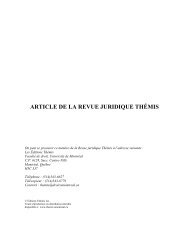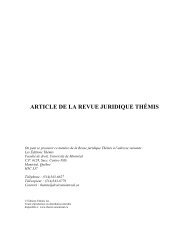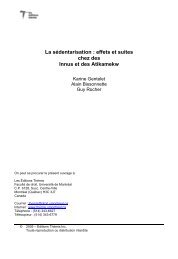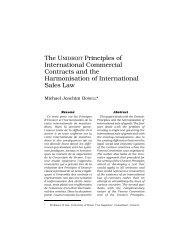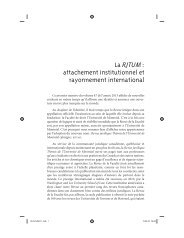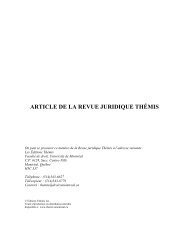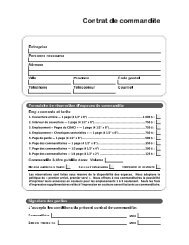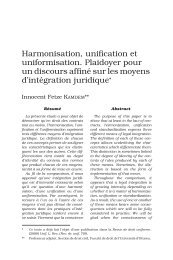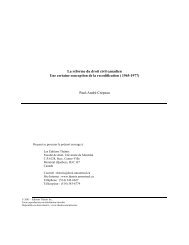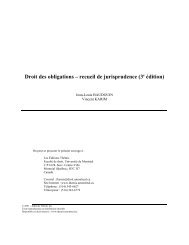The UNIDROIT Principles of International Commercial Contracts and ...
The UNIDROIT Principles of International Commercial Contracts and ...
The UNIDROIT Principles of International Commercial Contracts and ...
You also want an ePaper? Increase the reach of your titles
YUMPU automatically turns print PDFs into web optimized ePapers that Google loves.
THE <strong>UNIDROIT</strong> PRINCIPLES AND MERCOSUR COUNTRIES 389<br />
<strong>of</strong> the Civil Code. On the other h<strong>and</strong>, when the contract is executed<br />
a b road but its place <strong>of</strong> perf o rmance is situated in the Arg e n t i n e<br />
territory, it is then governed by the territorial law, that is, by the<br />
A rgentine law (lex executionis), a c c o rding to Article 1,209 <strong>of</strong> the C i v i l<br />
Code.<br />
Though the Argentine rules <strong>of</strong> private international law neither<br />
distinguish themselves by their clarity, nor expressly mention the<br />
party autonomy principle, eminent Argentine jurists such as<br />
Goldschmidt <strong>and</strong> Boggiano support the acceptation <strong>of</strong> the latter<br />
principle 20 .<br />
A rgentine courts, however, reject it massively, except for rare<br />
exceptions 21 . In that sense, a decision <strong>of</strong>ten mentioned is the case<br />
Feramérico v. Lital S.A., in which the parties’ autonomy to choose<br />
the law applicable to the contract was, more clearly, acknowledged<br />
by the Supreme Court 22 .<br />
– Arbitration<br />
<strong>The</strong> Argentine Federal Code <strong>of</strong> Civil <strong>and</strong> <strong>Commercial</strong> Procedure,<br />
along with the provincial codes, govern domestic arbitration. At<br />
international level, Argentina is a party to the 1958 UN Convention<br />
on the Recognition <strong>and</strong> Enforcement <strong>of</strong> Foreign Arbitral Awards (New<br />
York Convention), the 1975 I n t e r-American Convention on <strong>International</strong><br />
<strong>Commercial</strong> Arbitration (Panama Convention) <strong>and</strong> the 1979<br />
Inter-American Convention on the Extraterritorial Validity <strong>of</strong> Foreign<br />
Judgements <strong>and</strong> Arbitral Awards (Montevideo Convention) 23 .<br />
20 Didier OPPERTI BADÁN, “El tratamiento juridico de los contratos comerciales<br />
i n t e rnacionales en el continente americano”, in <strong>The</strong> UN I D R O I T <strong>Principles</strong>: A<br />
Common Law <strong>of</strong> <strong>Contracts</strong> for the Americas?, op. cit., note 10, p. 35. According<br />
to the author, Goldschmidt grounds the autonomy on a consuetudinary norm,<br />
originated in Articles 1,143 <strong>and</strong> 1,197 <strong>of</strong> the Argentine Civil Code. Boggiano<br />
accepts the autonomy based on Articles 19 <strong>and</strong> 31 <strong>of</strong> the Argentine Constitution.<br />
21 Cecilia FRESNERO, La autonomia de la voluntad en la contratación intern a c i o n a l ,<br />
Montevideo, Fundación de Cultura Universitaria, 1991, p. 49, in N. de ARAÚJO,<br />
op. cit., note 13, p. 73.<br />
22 Id.<br />
23 For a panorama <strong>of</strong> arbitration in the Mercosul countries, see: Adriana Noemi<br />
PUCCI, Arbitragem Comercial nos Países do Mercosul, S P, LTr, 1997. In this<br />
excellent work the author does not examine, however, the question <strong>of</strong> the law<br />
applicable to the arbitration in the respective countries.



